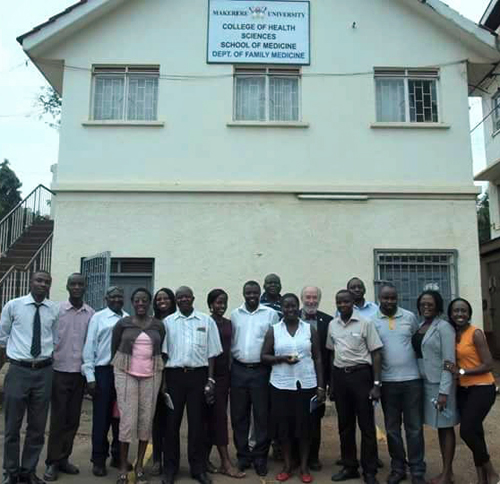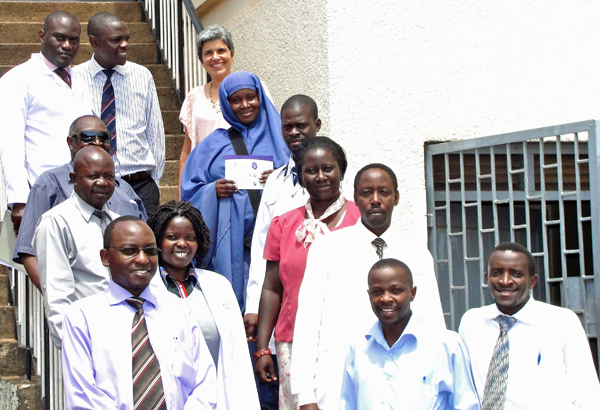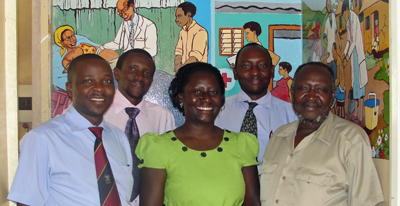Development of Family Medicine in Uganda
Background
Family Medicine is rapidly evolving in Africa. By the year 2000, family medicine was well known only in South Africa and Nigeria. However by 2016, efforts to promote the discipline were underway in almost all African countries. Those countries without family medicine such as Burundi and South Sudan are contemplating launching training programs. This rapid development is largely due to politicians, health managers and academics realization of family physicians’ potential contributions to the performance of health systems. However, family medicine remains a poorly understood medical specialty through most of the African continent. Therefore, it is important for countries to document and share their experiences to foster continued growth, to evaluate the impact, and to establish best practices.
 Family Medicine in Uganda
Family Medicine in Uganda
• The first training Programme, named Community Practice, was started in 1989 with the aim of training all round clinically competent generalists to provide clinical services in rural health facilities where more than 80% of Ugandans lived.
• The programme was funded by the Canadian International Development Agency (CIDA) in partnership with Memorial University, Makerere University and the Ugandan Ministry of Health. Prof John Munro Ross from Memorial University stayed at Makerere University to run this project for the five year period.

• The first year of the project was for planning and curriculum development. At the end of the project, fifteen generalists had completed the four-year training period.
• After the project, Makerere University recruited two faculty who continued the programme with a fluctuating number of trainees with some years having no trainees.
Photos show Visiting faculty, residents and undergraduate students at the Department of Family Medicine Makerere University.
• A similar programme named Integral Medicine was introduced at Mbarara University of Science and Technology (MUST) in Uganda in 1999 with the main aim of improving physicians’ surgical skills to work in rural hospitals.
• In 2005 the Makerere programme name was changed from Community Practice to Family Medicine when Dr Haq served as a visiting professor from the University of Wisconsin. The curriculum was revised to include the principles of family medicine and other primary care related topics.
• The training programme was accredited by the Ugandan medical licensing body. Graduates were recognized and paid as specialists by the Ugandan Ministry of Health.
• In 2012, another family medicine training programme was introduced at International Health Sciences University (IHSU), a private university in Kampala Capital City.
• All the programmes are recruiting and training at less than full capacity. However, there has been a steady increase in the number of trainees in the last eight years with a significant number of potential trainees expressing interest.
• Several Ugandan family physicians have been trained abroad and returned to Uganda to practice.

Currently there are three, three-year family medicine programmes in Uganda. They can be summarized as:
1. Makerere University has nine faculty and 15 residents. Its training sites are Mulago National Referral and Teaching Hospital (MNRTH) and Tororo General/District Hospital. The program has trained more than 50 graduates who are practicing throughout the country.
2. Mbarara University has three faculty but no residents. Its training site is Mbarara Regional Referral Hospital (MRRH)
3. International Health Sciences University has two faculty and five residents. Its training site is the International Hospital Kampala (IHK) and its affiliated clinics
Issues that have affected scaling up
• Family Medicine at Makerere started as a postgraduate programme with no curriculum for undergraduate medical students. Family medicine was introduced into the undergraduate curriculum in July 2014. We expect more medical students will select family medicine if they are exposed to positive role models early in their training.
• Post-graduate residency training programs in Uganda require trainees to pay substantial tuition to the university. This limits the potential number of trainees.
• There are very few family medicine faculty with limited support or opportunities for faculty development. Makerere has no senior faculty in family medicine, all faculty are at the rank of Lecturer; there are no Senior Lecturers, Associate or full Professors.
What is needed for family medicine to flourish?
1. Training of family physicians needs to be supported at all levels by all the stakeholders. One form of such support would be providing scholarships and providing salaries to support post-graduate training.
2. Family physicians should be recruited into public service employment by the Health Service Commission as family physicians and not as Public Health Specialists. Then, their career path will be made clearer and they will be able to focus on providing clinical services and supervision of other health personnell.
3. Family physicians should have opportunities for faculty development and to be promoted to the highest possible rank as other medical specialists.
4. Strengthening partnerships between the Ministry of Health, Ugandan training institutions and international colleagues to promote and market family medicine.
We believe that the future is bright and look forward to continued growth and development of the specialty.
Jane Namatovu MBBS
Head, Department of Family Medidicne, Makerere University
Cynthia Haq MD
Professor of Family Medicine, University of Wisconsin